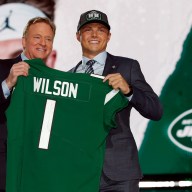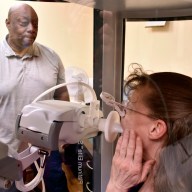NFL players are not just being locked out from playing football, they are
also being locked up at an alarming rate. The arrest of Cincinnati Bengals
running back Cedric Benson last Sunday morning was the latest in an offseason that could be described as
“Players Gone Wild.”
Since the
end of the Super Bowl on Feb. 6, the first two months of the offseason saw a
significant jump in player arrests with 13 players locked up during that
eight-week span, compared to seven arrests during the same stretch last year. A
big part of the incarceration problem is that without the structure of the NFL
offseason, many players are without a regimen that keeps their days ordered.
The 54
percent increase in arrests during the first two months of the lockout means players are using their downtime in less than productive ways.
In a
typical NFL offseason, players will have roughly a month off after the Super
Bowl to recuperate before they then begin offseason workout programs at the
team facilities. The typical strength and conditioning time lasts until the NFL
Draft in April when within a week of selecting the draft picks, all rookies
including undrafted free agents will attend rookie camp.
Whole
teams will convene, usually in late May, for Organized Team Activities
(OTAs),which usually garner nearly 100 percent participation. Several weeks of
OTAs — typically held twice weekly — feed into mini-camp in mid-June. Mini-camp is the last time the team is together until
training camp in late July.
“One of the great things about the league, about the
NFL, is the structure to it, the accountability. The league provides this
framework for the players that maximizes their time, their offseason, I believe
better than any other league,”said former Kansas City Chiefs general manager
and CEO Carl Peterson, who serves as the chairman of USA Football.
Peterson was an executive in Kansas City for nearly 20
years.
“It wouldn’t surprise me to hear that players might be having trouble in
the offseason where there isn’t that type of structure, the accountability of
the workouts and the camps and such,” he said. “You’re talking about young
players with lots of free time and money. Those who aren’t settled can get
drawn away with distractions.”
The
structure and accountability in a typical offseason is a grind for most players,
but in a year with a labor impasse, players who left their teams at the end of
the season have been on their own for nearly 16 weeks with only their agents
to influence them. The vacuum of accountability can be a major issue with large
gaps of time to fill.
“Players
don’t have the schedule that they would normally,” Jets tight end Dustin Keller
told Metro New York. “If you decide to stay out late and you miss your morning
workout, you can just call your trainer and reschedule for 2 p.m. and there’s
no consequences. If there isn’t a lockout, you can’t do that with the team; you
have to be there no matter what. It makes you more accountable if you’re not
likely to want to do that on your own.”
As part of the lockout, not only do players lose access to
team facilities and contact with management, there is also a loss of benefits,
including team hired protection services that are trained to guide and escort
athletes through public appearances or even a night out on town, ensuring their
safe travel … and hopefully no arrests.
Peterson had
developed relationships with the Kansas City police department to help mitigate
any player issues, but he noted that with the rise of Facebook and Twitter and
the 24-hour news cycle,“it does seem like issues are on the rise.”
“It really is about making smart decisions and choices, not
doing anything dumb or going out and putting yourself in a stupid position,”
Buffalo Bills wide receiver Donald Jones said. “Saving your money and using
your time well even if you don’t have a team telling you that. If you’re in the
NFL, you have to know how to act and respond.”
The recent
string of arrests, including the squeaky clean Hines Ward, underscored that
without structure, players will find a way to fill their time with something –
and it may not always be productive.
“I’m not
the kind of guy who gets in trouble personally. I’m low key off the field but I
also want to focus on what has gotten me here to the NFL, to being a part of
this Jets team. Going out at night hasn’t gotten me here – but workouts and
taking care of myself and being smart with my body and time has,” linebacker
Bart Scott said. “We as a team don’t worry about this lull right now or
whatever you want to call it. [Head coach] Rex Ryan and [general manager Mike]
Tannenbaum did a good job bringing in high character guys here who don’t need
to be told that they need to make smart choices. We know what to do even in a
lockout.”
Keller and
Scott both said that the Jets as an organization never addressed time
management or offseason behavior — “we’re professionals, we all know it,” said
Keller — but other teams took the initiative this past winter. Peterson said that three times a year in Kansas City he addressed
the team on accountability issues and that if he was still in an executive role
with an NFL team, he would have had a discussion with the players prior to the
lockout.
Arizona
Cardinals safety Kerry Rhodes said that the coaching staff spoke with the team
after they cleared out their lockers at the end of the season.
“They
talked with us openly about just being smart, about using our time well,”
Rhodes said. “Not being foolish but being grown men in all of this. Everyone
has a lot to use, and we need to use this time wisely. It isn’t ideal, and you
can’t duplicate camp or the structure of the NFL offseason, but you can control
what you do.”
Rhodes
wakes up at 7 a.m. most days for a workout with his trainer an hour later. That
will take up much of the morning until he breaks for lunch and “a little nap.”
Then he studies the playbook for an hour. That leads him to
mid-afternoon for his second workout, which is either running or playing some
basketball. Dinner follows that, usually in his Los Angeles home.
“I am in
bed around nine o’clock most nights,” Rhodes said.
Rhodes’ teammate Andre
Roberts is in Minnesota training with fellow Arizona wideout Larry Fitzgerald.
“We as a team with the coaches definitely talked about it,” Roberts said.” The
message was ‘Be safe, be smart — use your time well.’ We didn’t know how long
this thing would last and the coaches wanted us to use our time well and not
foolishly.”
Roberts said he lifts weights four times a week. The team’s
offense convened on the campus at Arizona State University in May for informal
workouts for three days. He said that the structure has helped him stay
focused.
And without a set schedule, it is all about personal
accountability and up to the players to police themselves off the field. Sans
the rigors of a NFL offseason schedule and the continual supervision of the
team, there is a full 24 hours in a day for a NFL player to potentially get in
trouble. Given the egos and paychecks of many of these athletes, the
possibilities for trouble are endless.
“There is every possible reason to have a significant
increase in arrests, especially in the weeks immediately after the lockout
began,” said Dr. John F. Murray, a sports psychologist and author of the Mental
Performance Index. “At the beginning, it looked like the lockout could
threaten the season as the two sides were very far apart, the rhetoric was
heated. With the idle times these players have and with no accountability or
consequences for a few months, it makes sense that players without guidance
would be left to their own whims. Now that things seem closer to settling, the
players probably seem more focused too on the job ahead.”
With the league and union perhaps nearing a labor agreement,
accountability is potentially just weeks away. Perhaps then it should be no
surprise that the number of arrests have dipped in recent weeks to the point
that after a rough opening two months of the lockout, arrests are now at the
same pace as last year. As players get closer to a possible training camp,
their mentality seems to be shifting.
“People think the lockout is going to be over soon and
training camp would be coming up right around the corner so guys that haven’t
been doing their work are focuses,” Roberts said. “A lot of guys may not be as
focused on going out, might be a little more focused on the field. That’s
really where our minds should have been all along.”
Rhodes said that when a fellow NFL
player gets arrested, he will often send either an email or a text message to
players on the team reminding them to “do the right thing.”
“I think
the guys in the league have heard about it, about other players getting in
trouble. I think they’re catching on now,” Rhodes said.
For
Rhodes, who is working on launching a television and movie production company
and Scott, whose “Can’t Wait” clothing line is coming out soon, business
ventures can be a welcome way to stay busy. And a partner
to hold you accountable doesn’t hurt either.
“My wife
gives me a curfew – I’m allowed out two nights a week,” Scott said with a
straight face. “She doesn’t want me just running around out there.”
Follow Kristian Dyer on Twitter @KristianRDyer and get all your New York sports news @MetroNYSports.
















